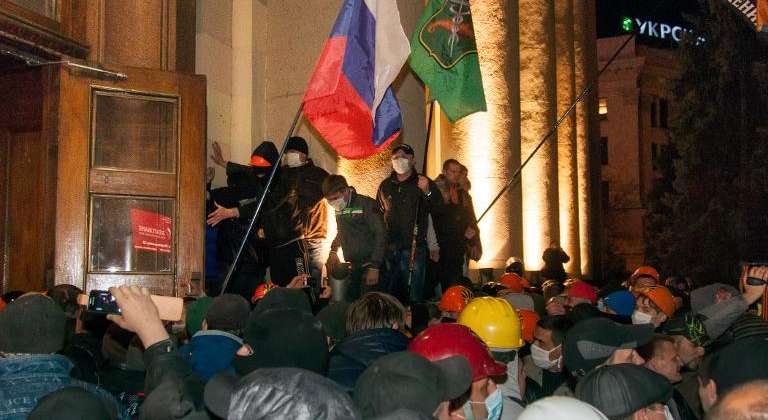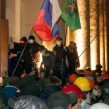
Armed Pro-Russian Activists in Lugansk May Trigger a Russian Invasion
Publication: Eurasia Daily Monitor Volume: 11 Issue: 68
By:

A well-coordinated attack on local administrative buildings by pro-Russian activists in eastern Ukrainian cities Donetsk, Kharkiv and Lugansk began on April 6. Local police forces did little to stop the rioting, while local government buildings and the local Ukrainian security service (SBU) headquarters were ransacked and occupied. The pro-Russian activists declared themselves to be self-styled legislative bodies and declared Donetsk, Kharkiv and Lugansk regions to be sovereign “People’s Republics.” On April 7, the Joint Donbas People’s Committee—the governing body of the self-proclaimed Donetsk People’s Republic—published a letter to Russian President Vladimir Putin, “as the sole defender of our Russian culture” to send Russian military “peacekeeping forces” into Eastern Ukraine “to stop the crimes of the neo-fascist Kyiv junta [the interim Ukrainian government]” (https://www.mk.ru/politics/article/2014/04/07/1010161-russkaya-vesna-v-dokumentah-kakie-aktyi-prinyala-donetskaya-narodnaya-respublika.htm).
By April 8, it became clear the attack by pro-Russian activists in Eastern Ukraine lacked genuine popular support. Calls for local referendums to join Russia, like the one in Crimea on March 16, failed to gather multi-thousand-strong crowds of enthusiastic supporters. The Kyiv authorities moved in some loyal reinforcements to replace local police and managed to disperse the “Kharkiv People’s Republic” without bloodshed, arresting over 60 protesters, apparently including the entire “Kharkiv Republic” leadership. Calls for mass strikes and civil disobedience in Donetsk, Kharkiv and Lugansk were ignored by the local public. The Ukrainian authorities hope to negotiate a peaceful surrender by protesters occupying government buildings in Donetsk and Lugansk. In Donetsk, the negotiations were joined by Rinat Akhmetov—Ukraine’s richest tycoon and former chief sponsor of ousted president Viktor Yanukovych. Though Donbas is Akhmetov’s main power base, his business holdings and interests are diverse, covering different parts of the country. A breakup of Ukraine does not seem in Akhmetov’s interest—he could lose important parts of his vast business empire, no matter on which side of the future possible divide he may stand (https://www.rbcdaily.ru/politics/562949991106424).
The Kremlin-controlled Russian press and TV solidly supported the coordinated attack by pro-Russian activists in Eastern Ukraine. Initial reports created the false impression the sovereign “People’s Republics” were being proclaimed by legitimate local legislatures. Not a single Donbas legislative deputy from the former ruling Party of Regions that dominated the Donbas region took part in the proclamation of the Donetsk People’s Republic or the call for Russian troops, but this was not reported by the Russia media, which insisted that a mass people’s rebellion was happening (https://rus.newsru.ua/ukraine/07apr2014/nikogo_print.html). The government in Kyiv believes the attack by pro-Russian activists in Eastern Ukraine was inspired by Moscow to destabilize Ukraine and further undermine its sovereignty and territorial integrity by promoting a “federalization” that would swiftly lead to breakup and possible integration of eastern and southern Ukraine by Russia (https://www.interfax.ru/print.asp?sec=1446&id=369938).
Russia continues to insist that Ukrainian nationalists and their aggressive rhetoric bear full responsibility for the crisis, which “resulted in the reunification of Crimea with Russia” last month. Moscow has insisted that a federal form of government that would legalize the divide of Ukraine into a Ukrainian-speaking west and a Russian-speaking east and south is the only way out of the protracted crisis (https://en.ria.ru/world/20140408/189101924/Special-Forces-Blockade-Regional-Administration-Building-in.html). This week (April 7), the Russian Ministry of Foreign Affairs went much further, issuing an official statement accusing the Kyiv authorities of sending troops of the newly formed National Guard, “including fighters of the illegal extreme nationalist Right Sector and 150 armed American mercenaries from the Greystone private military contracting organization masquerading as a Ukrainian Special Forces ‘Falcon’ unit.” The Russian foreign ministry accused the “organizers of this provocation,” of threatening the rights, freedom and lives of peaceful Ukrainian citizens, and of “preparing to unleash a civil war” (https://www.facebook.com/MIDRussia/posts/475475109218602).
Both Graystone Ltd. and Kyiv officials denied that any military contractors or “mercenaries” were deployed in Ukraine (https://www.vesti.ru/doc.html?id=1458235). The denials did not change the propaganda assault about Americans “training terrorists” and preparing to kill Russians, however (https://www.mk.ru/politics/world/article/2014/04/09/1011468-ekspert-greystone-treniruet-natovskih-terroristov.html). The accusation of the United States’ involvement is a traditional Russian ploy to justify aggressive military action since the times of the Cold War. Russian troops have been told they were only hours ahead of invading US forces, when they invaded Afghanistan in 1979 (VPK, April 9). The same ploy was used in other Soviet and Russian invasions. The Russian foreign ministry’s unfounded allegations of US involvement underline the seriousness of the situation and the closeness of a possible massive Russian invasion in Ukraine.
Trade between Russia and Ukraine began decreasing before the fall of Yanukovych: In January–February 2014 it was 10.5 percent less than in the same period of 2013 (https://news.mail.ru/economics/17728429/). This month (April), Moscow doubled the price Ukraine pays for natural gas to almost $500 for 1,000 cubic meters. Kyiv announced it will not pay, insisting this was politically motivated blackmail and is demanding further negotiations. Moscow has threatened to cut gas supplies, and Putin has informed European leaders the transit of gas through Ukraine to Europe may also stop, if the European Union does not help the Ukrainians with their gas debt—which Gazprom has estimated to be $2.238 billion (https://www.interfax.ru/world/370835). At a special cabinet meeting in the Kremlin this week, Putin ordered the Russian government to prepare for a possible total termination of any trade with Ukraine and to be ready to replace key Ukrainian imports, including weapons components. At present, existing contracts for industrial purchases by Russia in Ukraine, including military/industrial products, are worth some $15 billion. And Ukrainian companies are honoring them, despite the deepening crisis (https://www.kremlin.ru/news/20746).
On April 7, a leading member of the ruling United Russia party and Duma deputy Vyacheslav Nikonov (grandson of Vyacheslav Molotov, Soviet prime minister and foreign minister under Joseph Stalin) told journalists Russia may invade Ukraine if force is used to suppress the population and there is bloodshed. “Putin has been given authority to use military force on Ukrainian territory,” stated Nikonov, “Authorities in Kyiv could legitimatize themselves by changing the constitution and recognizing Russian as an official language, but are ignoring these just demands” (https://ria.ru/world/20140407/1002891820.html). Heavily armed pro-Russian activists in Lugansk continue to occupy the local SBU office. Deputy chief of the Ukrainian presidential administration Andrei Senchenko is reported to have called the Lugansk activists “terrorists” that have mined the building and “are taking orders from Russian military intelligence [GRU].” According to Senchenko, if the activists in Lugansk do not surrender soon, armed force may be used (https://www.0642.ua/article/513269). Any clash resulting in casualties may, in turn, trigger an invasion by Russian troops massed on the Ukrainian border.




